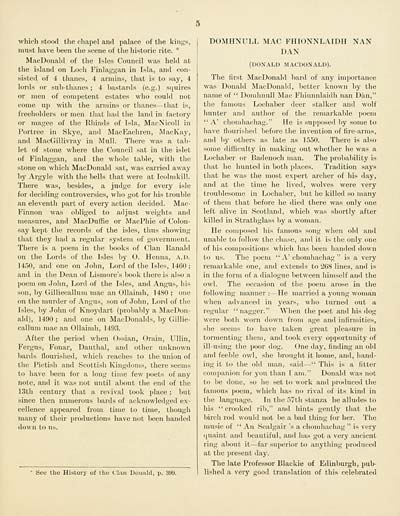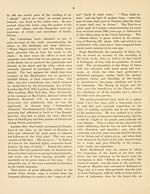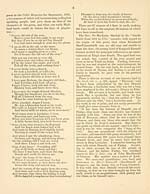Download files
Complete book:
Individual page:
Thumbnail gallery: Grid view | List view

which stood the chapel and palace of the kings,
must have been the scene of the historic rite. *
MacDonald of the Isles Council was held at
the island on Loch Finlaggan in Isla, and con-
sisted of 4 thanes, 4 arniins, that is to say, 4
lords or sub-thanes; 4 bastards (e.g.) squires
or men of competent estates who could not
come up Avith the armins or thanes — that is,
freeholders or men tliat Iiad the land in factory
or magee of tlie Rhinds of Isla, MacNicoU in
Portree in Skye, and MacEachren, MacKay,
and MacGillivray in Mull. Tiiere was a tab-
let of stone where the Council sat in the islet
of Finlaggan, and the whole table, with the
stone on which MacDonald sat, was carried away
l»y Argyle with the bells that were at Icolmkill.
There was, besides, a judge for every isle
for deciding controversies, who got for his trouble
an eleventh part of every action decided. Mac-
Finnon was obliged to adjust weights and
measures, and MacDuffie or MacPhie of Colon-
say kept the records of the isles, thus showng
that they had a regular system of government.
There is a poem in the books of Clan Ranald
on the Lords of the Isles by O. Henna, A.D.
1450, and one on John, Lord of the Isles, 1460 ;
and in the Dean of Lisniore's book there is also a
poem on Joim, Lord of the Isles, and Angus, his
son, by Gilliecallum mac an OUaimh, 1480 ; one
on the murder of Angus, son of John, Lord of the
Isles, by John of Knoydart (probably a MacDon-
ald), 1490 ; and one on MacDonalds, by Gillie-
callum mac an Ollaindi, 1493.
After the period when Ossian, Grain, Ullin,
Fergus, Fonar, Dauthal, and other unknown
l)ards flourished, which reaches to the union of
the Pictish and Scottish Kingdoms, there seems
to have been for a long time ìg\ì' poets of any
note, and it was not until about tlie end of the
13th century that a revival took place ; but
since then numerous bards of acknowledged ex-
cellence appeared from time to time, though
many of their productions have not been handed
dow n to us.
' See the History of the Clan Donald, p. 399.
DOMHNULL MAC FHIONNLAIDH NAN
DAN
(DONALD MACDONALD).
The first MacDonald bard of any importance
was Donald MacDonald, better known by the
name of " Domhnull Mac Fhiunnlaidh nan Dan,"
the famous Lochaber deer stalker and wolf
hunter and author of the remarkable poem
" A' chomhachag." He is supposed by some to
have flourished before the invention of fire-arms,
and by others as late as 1550. There is also
some difficulty in making out whether he was a
Lochaber or Badenoch man. The probability is
that he hunted in both places. Tradition says
that he was the most expert archer of his ilay,
and at the time he lived, wolves were very
troublesome in Lochaber, but he killed so many
of them that before he died there was only one
left alive in Scotland, which was shortly after
killed in Strathglass by a woman.
He composed his famous song when old and
unalile to follow the chase, and it is the only one
of his compositions which has been handed down
to us. The poem " A' chomhachag " is a very
remaikable one, and extends to 268 lines, and is
in the form of a dialogue between himself and the
owl. The occasion of the poem arose in the
following manner : — He married a young woman
when acUanced in years, who turned out a
regular "nagger." When the poet and his dog
Mere lioth worn down from age and infirmities,
slie seems to have taken great pleasure in
tormenting them, and took every opportunity of
ill-using the jjoor dog. One day, finding an old
and feeble owl, she brought it home, and, hand-
ing it to the old man, said — " This is a fitter
companion for you than I am." Donald was not
to be done, so he set to work and imiduccd the
famous poem, which has no rival of its kind in
the language. In the 57th stanza he alludes to
his " crooked rib," and hints gently that the
birch rod would not be a bad thing for her. The
music of " An Sealgair 's a ciiondiaciiag " is very
quaint and beautiful, and has got a very ancient
ring about it — far superior to anything produced
at the present day.
The late Professor Blackie of Edinburgh, pub-
lished a very good translation of this celebrated
must have been the scene of the historic rite. *
MacDonald of the Isles Council was held at
the island on Loch Finlaggan in Isla, and con-
sisted of 4 thanes, 4 arniins, that is to say, 4
lords or sub-thanes; 4 bastards (e.g.) squires
or men of competent estates who could not
come up Avith the armins or thanes — that is,
freeholders or men tliat Iiad the land in factory
or magee of tlie Rhinds of Isla, MacNicoU in
Portree in Skye, and MacEachren, MacKay,
and MacGillivray in Mull. Tiiere was a tab-
let of stone where the Council sat in the islet
of Finlaggan, and the whole table, with the
stone on which MacDonald sat, was carried away
l»y Argyle with the bells that were at Icolmkill.
There was, besides, a judge for every isle
for deciding controversies, who got for his trouble
an eleventh part of every action decided. Mac-
Finnon was obliged to adjust weights and
measures, and MacDuffie or MacPhie of Colon-
say kept the records of the isles, thus showng
that they had a regular system of government.
There is a poem in the books of Clan Ranald
on the Lords of the Isles by O. Henna, A.D.
1450, and one on John, Lord of the Isles, 1460 ;
and in the Dean of Lisniore's book there is also a
poem on Joim, Lord of the Isles, and Angus, his
son, by Gilliecallum mac an OUaimh, 1480 ; one
on the murder of Angus, son of John, Lord of the
Isles, by John of Knoydart (probably a MacDon-
ald), 1490 ; and one on MacDonalds, by Gillie-
callum mac an Ollaindi, 1493.
After the period when Ossian, Grain, Ullin,
Fergus, Fonar, Dauthal, and other unknown
l)ards flourished, which reaches to the union of
the Pictish and Scottish Kingdoms, there seems
to have been for a long time ìg\ì' poets of any
note, and it was not until about tlie end of the
13th century that a revival took place ; but
since then numerous bards of acknowledged ex-
cellence appeared from time to time, though
many of their productions have not been handed
dow n to us.
' See the History of the Clan Donald, p. 399.
DOMHNULL MAC FHIONNLAIDH NAN
DAN
(DONALD MACDONALD).
The first MacDonald bard of any importance
was Donald MacDonald, better known by the
name of " Domhnull Mac Fhiunnlaidh nan Dan,"
the famous Lochaber deer stalker and wolf
hunter and author of the remarkable poem
" A' chomhachag." He is supposed by some to
have flourished before the invention of fire-arms,
and by others as late as 1550. There is also
some difficulty in making out whether he was a
Lochaber or Badenoch man. The probability is
that he hunted in both places. Tradition says
that he was the most expert archer of his ilay,
and at the time he lived, wolves were very
troublesome in Lochaber, but he killed so many
of them that before he died there was only one
left alive in Scotland, which was shortly after
killed in Strathglass by a woman.
He composed his famous song when old and
unalile to follow the chase, and it is the only one
of his compositions which has been handed down
to us. The poem " A' chomhachag " is a very
remaikable one, and extends to 268 lines, and is
in the form of a dialogue between himself and the
owl. The occasion of the poem arose in the
following manner : — He married a young woman
when acUanced in years, who turned out a
regular "nagger." When the poet and his dog
Mere lioth worn down from age and infirmities,
slie seems to have taken great pleasure in
tormenting them, and took every opportunity of
ill-using the jjoor dog. One day, finding an old
and feeble owl, she brought it home, and, hand-
ing it to the old man, said — " This is a fitter
companion for you than I am." Donald was not
to be done, so he set to work and imiduccd the
famous poem, which has no rival of its kind in
the language. In the 57th stanza he alludes to
his " crooked rib," and hints gently that the
birch rod would not be a bad thing for her. The
music of " An Sealgair 's a ciiondiaciiag " is very
quaint and beautiful, and has got a very ancient
ring about it — far superior to anything produced
at the present day.
The late Professor Blackie of Edinburgh, pub-
lished a very good translation of this celebrated
Set display mode to: Large image | Transcription
Images and transcriptions on this page, including medium image downloads, may be used under the Creative Commons Attribution 4.0 International Licence unless otherwise stated. ![]()
| Early Gaelic Book Collections > Ossian Collection > Macdonald bards from mediaeval times > (15) |
|---|
| Permanent URL | https://digital.nls.uk/80460581 |
|---|
| Description | Selected books from the Ossian Collection of 327 volumes, originally assembled by J. Norman Methven of Perth. Different editions and translations of James MacPherson's epic poem 'Ossian', some with a map of the 'Kingdom of Connor'. Also secondary material relating to Ossianic poetry and the Ossian controversy. |
|---|
| Description | Selected items from five 'Special and Named Printed Collections'. Includes books in Gaelic and other Celtic languages, works about the Gaels, their languages, literature, culture and history. |
|---|

